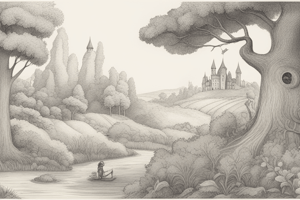Podcast
Questions and Answers
What is the primary function of the respiratory system?
What is the primary function of the respiratory system?
- To generate life
- To transport oxygen and remove carbon dioxide (correct)
- To remove waste products
- To produce energy
Which organ controls breathing and separates the chest cavity from the abdominal cavity?
Which organ controls breathing and separates the chest cavity from the abdominal cavity?
- Lungs
- Heart
- Trachea
- Diaphragm (correct)
What is the process called where oxygen is transported to the cells and carbon dioxide is removed?
What is the process called where oxygen is transported to the cells and carbon dioxide is removed?
- Cellular respiration
- Gas transfer
- Oxygenation
- Gas exchange (correct)
Which of these is NOT a function of the respiratory system?
Which of these is NOT a function of the respiratory system?
What happens to the human body without oxygen for about five minutes?
What happens to the human body without oxygen for about five minutes?
Which of the following is NOT a chronic respiratory disease?
Which of the following is NOT a chronic respiratory disease?
What is the main function of the alveoli in the respiratory system?
What is the main function of the alveoli in the respiratory system?
Which of the following is a chronic respiratory disease?
Which of the following is a chronic respiratory disease?
What is the primary role of the respiratory system in the body?
What is the primary role of the respiratory system in the body?
What is the recommended course of action for treating a viral respiratory ailment?
What is the recommended course of action for treating a viral respiratory ailment?
What is the composition of the alveolar walls in the lungs?
What is the composition of the alveolar walls in the lungs?
What additional functions does the respiratory system serve apart from gas exchange?
What additional functions does the respiratory system serve apart from gas exchange?
Flashcards are hidden until you start studying
Study Notes
Functions of the Respiratory System
The respiratory system plays a crucial role in the human body. Its primary function is to transport oxygen from the air we breathe to the cells within our body, and to remove carbon dioxide, a waste product produced by our cells. This process, known as gas exchange, is essential for generating energy and maintaining life. The system also helps protect us from harmful particles and germs, allows us to smell and speak, and regulates the temperature and humidity of the air we breathe.
Respiratory System Organs
The main organs of the respiratory system are the lungs. They are part of the lower respiratory tract, which also includes the trachea, bronchi, bronchioles, and air sacs (alveoli). The upper respiratory tract includes the nose, mouth, pharynx (throat), larynx (voice box), and sinuses. The diaphragm, a dome-shaped muscle at the bottom of the lungs, controls breathing and separates the chest cavity from the abdominal cavity. The human body needs oxygen to sustain itself, and after only about five minutes without oxygen, brain cells begin dying, which can lead to brain damage and ultimately death.
Respiratory System Diseases
Diseases and conditions of the respiratory system can be categorized into infections and chronic diseases. Viral infections, such as influenza, bacterial pneumonia, and enterovirus respiratory virus, can be treated by letting them run their course. Antibiotics are not effective for treating viruses, and the best course of action is usually rest. Common respiratory ailments include coughing, possibly accompanied by a fever.
Chronic respiratory diseases include asthma and chronic obstructive pulmonary disease (COPD). These conditions can be managed with medication, lifestyle changes, and in some cases, surgery.
Gas Exchange in the Lungs
Gas exchange occurs in the lungs, specifically in the small air sacs (alveoli). The alveolar walls are extremely thin (about 0.2 micrometers) and are composed of a single layer of tissues called epithelial cells. Oxygen from inhaled air passes into the blood, and carbon dioxide, the waste product of cellular respiration, moves into the alveoli and gets expelled in exhaled breath.
Importance of the Respiratory System
The importance of the respiratory system cannot be overstated. It provides the body with the essential oxygen required for cellular respiration and removes carbon dioxide, a waste product. It also protects the body from harmful particles and germs and allows for the perception of smell and speech. Without a functional respiratory system, the body would not be able to sustain life.
Studying That Suits You
Use AI to generate personalized quizzes and flashcards to suit your learning preferences.




